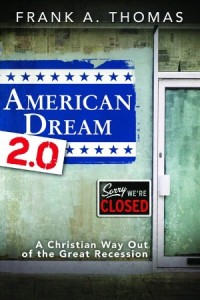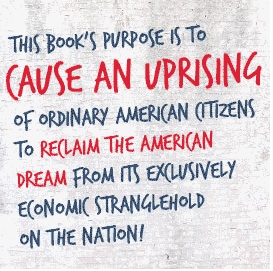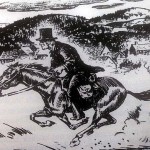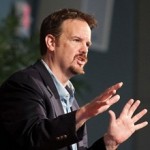 In his new book American Dream 2.0: A Christian Way Out of the Great Recession, Dr. Frank A. Thomas delivers a compelling argument for why we need a new “American Dream.” By giving a historical perspective on where our current version of the “American Dream” has come from and its implications for our future, Thomas deconstructs and proposes an alternative built on Jesus’ Gospel of the reign of God and Dr. Martin Luther King’s vision of “The Beloved Community.” Along the way, Thomas takes on the “controversial” topics of Rev. Jeremiah Wright, Barack Obama, and capitalism.
In his new book American Dream 2.0: A Christian Way Out of the Great Recession, Dr. Frank A. Thomas delivers a compelling argument for why we need a new “American Dream.” By giving a historical perspective on where our current version of the “American Dream” has come from and its implications for our future, Thomas deconstructs and proposes an alternative built on Jesus’ Gospel of the reign of God and Dr. Martin Luther King’s vision of “The Beloved Community.” Along the way, Thomas takes on the “controversial” topics of Rev. Jeremiah Wright, Barack Obama, and capitalism.
Thomas’s goal with this book is made clear in the introduction:
“The purpose of this book is to cause an uprising of ordinary American citizens — particularly pastors, their congregations, and all people of goodwill — to reclaim the American Dream from its exclusively economic stranglehold on the nation. Our challenge is to redevelop America without the exploitation or domination of subjected people.”
Later in the book, Thomas further explains, “This book is developed from, augments, and hopefully furthers black protest oratory and the prophetic tradition of the black church in the twenty-first century.”
Thomas says some things that are no doubt controversial but things that need to be heard and wrestled with, for example:
- “The church does not deny and pull away or uncritically endorse patriotism and prosperity gospel, but offers a prophetic critique of the American Dream and seeks to move the American Dream and a flawed culture into alignment with the values of the reign of God.”
- [Post 9/11:] “The American people could have been asked to sacrifice. The only people who truly sacrificed were military soldiers and their families. Our consumerist response to the first major event of the twenty-first century is a prime indicator of contemporary American values.”
- “The myth of perpetual growth, with unrestrained depletion of natural capital, ensures war, conflict, and violence in the human family, and actually brings about the very recessions that give rise to the myth of perpectual growth in the first place.”
I walked away from American Dream 2.0 with a much better historical perspective of the national myth of the “American Dream,” the work of Dr. King, and the black prophetic church tradition in general.
 It’s a little confusing but there is more about Jesus and the reign of God in Thomas’s chapter on “The Beloved Community,” and the chapter entitled “The Reign of God” actually focuses more on the conversion of different forms of capital and practical actions to take as a “citizen-activist.”
It’s a little confusing but there is more about Jesus and the reign of God in Thomas’s chapter on “The Beloved Community,” and the chapter entitled “The Reign of God” actually focuses more on the conversion of different forms of capital and practical actions to take as a “citizen-activist.”
Overall, American Dream 2.0 feels a little too academic for the popular audience that Thomas is seeking to reach and who really needs to read this book (which is everyone!). And Thomas’s suggestions for rethinking the American Dream sometimes fall short of his own stated radical notion of “uprising” (e.g., “Debt should be used only with the guidelines established by personal finance experts such as Dave Ramsey and Suze Orman”). But there is an extensive discussion guide in the back of the book that can be used by groups to pull out the salient points and arrive at personal applications.
Ultimately, this is a very important book that comes at an interesting time in our history, with the dueling Tea Party and Occupy movements still churning just below the surface of our social and political discourse. In my opinion, to be faithful to the Gospel of the reign of God in our time and our place, American Dream 2.0 should be required reading for anyone seeking to be missional in America.












